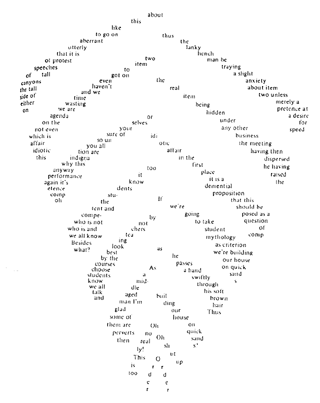Author News
R.I.P. Christine Brooke-Rose
I just heard that Christine Brooke-Rose passed away.
I first came across her work thanks to Brian McHale’s Postmodernist Fiction (1987), where he wrote about her 1975 novel Thru.
At the time, I was deeply into concrete poetry, in particular novelists who used concrete poetry techniques (Kenneth Patchen, B.S. Johnson, Ann Quin). So I was hooked. I picked up the 1986 Christine Brooke-Rose Omnibus, which contains Thru as well as its three “companion” novels: Out (1964), Such (1966), and Between (1968). All of them are decidedly unusual; like Johnson and Quin, Brooke-Rose was heavily inspired by the French New Novel of Alain Robbe-Grillet, Marguerite Duras, and Nathalie Sarraute. (She translated Robbe-Grillet’s In the Labyrinth.) Like all of those authors, Brooke-Rose was a brilliant maker of contemporary fiction who deserves to be more widely read.
The Omnibus is a good place to start (it was reprinted in 2007.) Out is a political fable set in Africa after a nuclear war, in which whites have become subservient to blacks. Such relates the internal monologue of an astrophysicist in his last few minutes of life. Between describes a professional translator whose marriage is collapsing; the novel freely alternates between English, French, and German, as well as present-moment monologue and idealized love letters. Thru presents itself as the product of a group narrator, a creative writing class whose members keep interrupting and erasing one another as they work to assemble a story:
Her hair is fair or dark, it doesn’t matter except in gothic romanesque now that there are such subtle dyes even within the text. She is pale and sits
Where?
On the campus
Can on sit on a campus?
She sits on a castle terrace in Spain.
Caramba not picaresque that’s as dead as the dread-letter novel.
In Slovenia, talking to the count
Titles have been abolished in Slovenia
turning her back to you. It is a warm summer evening.
As you can see, mostly the class argues over language and its politics. (The book also neatly satirizes writing workshops; more than once its members stop for majority votes.) (As you can also see, Brooke-Rose’s work was, above all, lots of fun.)
Brooke-Rose returned to the hybrid narrator again, in her 1986 novel Xorandor, which rather awesomely was printed by Avon as a mass-market sci-fi paperback:
The book’s twin narrators, Jip and Zab, construct the story in real-time on their computer, recounting how they discovered an alien stone (Xorandor) that turned out to be a kind of natural computer processor, and whose monstrous progeny posed an existential threat to England. The book reads like a time capsule of the 80s, playing freely with programming languages (its title is in binary, xor-and-or) and fears of nuclear crises. (Not to mention that book format!)
The only other novel I’ve read by Brooke-Rose (she wrote very many) is Amalgamemnon (1984), which was reprinted in the mid-90s by Dalkey Archive Press. (It just got reprinted again, with a new cover.) It, too, is a monologue, this time delivered by an insomniac literature and history professor who’s about to be fired. She spends a long night lost in a desperately clever tirade against new media and information technologies, as well as the then-current Culture Wars. (The novel’s pleasure in punning, and amalgamating classical myths, had a definite influence on my own writing, in particular Giant Slugs.)
Christine Brooke-Rose wrote a tremendous amount, including other novels and works of criticism, as well as collections of stories, poems, drawings, and essays. Plus two autobiographical novels—I’ve lots to catch up on!
Meanwhile, godspeed, Ms. Brooke-Rose. You were great. You will be missed.
Tags: alain robbe-grillet, Ann Quin, Avon Books, b.s. johnson, Brian McHale, Christine Brooke-Rose, Dalkey Archive Press, French New Novel, Nathalie Sarraute




One of my idols. Absolutely. Have just pulled down her essay “Illiterations” to reread as soon as I heard the news.
thanks for this. buying her books right now.
Dalkey also put out an issue of RCF on her: Vol. IX, #3 Kathy Acker / Christine Brooke-Rose / Marguerite Young.
And a scholarly book on her: Utterly Other Discourse: The Texts of Christine Brooke-Rose.
New Directions did Textermination. I think it’s OOP.
More here.
She’s terrific– I discovered her from David Hayman’s quintessential In the Wake of the Wake anthology, which introduced me to basically everything post-noveau roman that became a central part of my praxis.
I don’t know that anthology—thanks, Mike!
Sweet, thanks for this intro to her, Adam! A bit of Googling led me to David Auerbach’s pretty (I think) brilliant analysis of Xorandor as a way into larger discussion of quote-unquote experimental literature: http://www.waggish.org/2011/xorandor-by-christine-brooke-rose/. I’m actually tempted to just post a link to this by itself, but I don’t want to imply that this is somehow in “opposition” to your posting about CBR’s work, but just that it’s very interesting in its own right and a good thought launcher.
Oh, please post it! And thanks for finding it!
Thanks for this. I know this author only through Frank Kermode’s sympathetic reviews, have always meant to check her out.
I loved her novel “Life, End of,” which was decidedly a novel although it thought about aging and illness. (Also it was one of the books sympathetically reviewed by Frank Kermode, I think, as alan mentions in an earlier comment.)
That review of Xorandor is very interesting in its discernment of legitimate “puns” from those that “serve[] no purpose” (which indicates and is part of a concern for discriminating between accurate and inaccurate literary handling of “scientific” terms and concepts).
In other words, Auerbach is criticizing the use of accidental similarities between the looks and especially sounds of words as though those likenesses should be semantically disclosive. When a pun presents an accidental similarity between words as though it were substantial, this employment of accidence mars the reason – recoverable by the science in and of comparative linguistics – in linguistic mediation, which reason is exemplified by linguistic intelligibility (that is, by language per se).
Here’s the second of Auerbach’s two well-chosen examples:
The joke is on the phrase “mortal sin” and the German word der Sinn. (It’s more a visual pun than a homophone; Sinn is spoken like ‘zin’.) Another of the handful of ways to say ‘meaning’ in German is die Bedeutung, and a big discovery/controversy in 20th c. philosophy is whether associative and substitutive meanings of “meaning” should or even can be distinguished from each other. Are ‘sense’ and ‘signification’ usefully different, eh, senses of “meaning”, and if so, how so?
Auerbach is hostile to the little joke of “mortal bedeutung”, (I think) because ‘sin’ and ‘Sinn‘, as words with knowable histories, have no connection to each other and only look and sound (somewhat) like each other. Yoking together ‘vice’ and ‘meaning’ in this way, to him, delegitimizes – a little – the intelligibility of each word, by fabricating a connection that is not truly linguistic and thereby tending language (in a tiny way) towards gibberish.
I don’t agree; I think play is linguistically more generative, even if more self-undermining, than perhaps Auerbach does, as I understand him. I think intelligibility co-exists with at least a little gibberish ineradicably, and that understanding that is no argument against linguistic scientificity, but rather, is an argument for it.
I first read Brooke-Rose in her Pound book, ZBC of Ezra Pound (he had a critical book called ABC of Reading). It’s fine, although much of what it says about Pound’s poetry and literary project(s) is, I think, pretty thoroughly disseminated and well-understood at this time even by Modernism despisers. A pleasurable exposition of ideas that have become uncontroversial, conventional, and even normative is still worth working through and with.
—
[I just learned today that Jean Giraud (Moebius) also recently died — a similarly large loss.]
Hmm: understanding intelligibility’s co-existence with gibberish is by itself an argument for “linguistic scientificity?” Or leads to an argument? By understanding, do you mean something closer to “being aware of” or closer to “knowing the ins and outs of?”
(Also, I’m not 100% sure from the context w/o having read the book, but I think Auerbach made up that second example? To re-cast what he meant in a way that was easier to contextualize, like “oh yeah German’s a language” versus “wait what’s computer language.”)
Yeah.
Now I’m imagining a CBR & Moebius collaboration…
“Argument” in the sense of ‘side in a dispute’. “Understanding” closer to ‘knowing’ than to ‘being aware’.
The argument – the ‘side’ – provoked by considering that gibberish – irrational association – co-exists ineradicably in linguisticality with rational association is:
Play, by virtue of which, say, ‘Sinn‘ could be substituted for ‘sin’, is as originary in coming to understand ‘sin’ and/or ‘Sinn‘ as having stable, unitary, coherent meanings of ‘sin’ and ‘Sinn‘ are. As compelling as controllable substitutions of meanings for words are, the possibility of substituting a non-semantic likeness crowds, as it were, into semantic exchangeability.
Yes, this example is well-made by Auerbach. His point obtains: the likeness between words in different languages is like that between the ‘same’ word with radically different usages in the same language (as in his Xorandor example, where the ‘same’ word “real” has the fundamentally different meanings ‘actual’ and ‘number in a continuum’). (Not sure that the difference between natural and machine languages is compared or exploited here. Maybe.)
There is the equivocity exploited in “Get thee to a nunnery.”, where ‘nunnery’ means a) place without sexual interaction (dormitory where celibate women live), and the colloquial reversal b) place committed to sexual interaction (whorehouse). Then there is the equivocity of ‘bat’, meaning a) stick to hit a ball with, and b) mouse with wings.
For Auerbach (as I understand him), the former pun of ‘nunnery’ has a “purpose”: to play with the connotations of sexuality embedded in the legitimate sense of the word ‘nunnery’. The latter multiplicity of meanings (of ‘bat’) is adventitious and without “purpose”, and to say that, say, ‘Babe Ruth named his bat “Dracula”.’ is to traffic in word-play deleterious to the communicativeness of language.
That, anyway, is my understanding. What is yours?
Sorry for her passing but stuff like this, and these comments, are why I come here: to get taught how stupefyingly illiterate I am and to set me on my way to becoming less so. I’m already at my univ. library website locating what I can. Thanks.
Yeah, I’m down with all that. I think the kind of play you’re talking about can unquestionably be “originary” in “coming to” new understandings, poking at or earthquaking inherited/inhabited understandings, etc. etc. The word world (and the word world) would be boring as hell to be in if that weren’t true.
Auerbach’s most compelling argument, to me, has to do with what he terms “macostructures,” and which I guess I understand as the idea that such play by itself is not immediately or necessarily an examination of ideology, and in fact such play can take place heavily within traps of unexamined ideology, where you think you’re doing something cool with sins and cosines or something, but you’re ignoring “deeper” macrostructures that are informing what you think is cool/exciting/new-feeling in the first place. And I react to this mostly from seeing a lot of work (not any of CBR’s, which obv. I don’t know yet!) around in the language-shuffling vein that is—after the sparks stop and the dust settles—still inhabiting really tired tropes of family dynamics or father/son or love-as-providing-and-caretaking or gender or animals-really-have-it-easy-because-they-don’t-think-they-just-look-at-you or take-your-pick-of-things-you-can-have-a-sleekly-worded-but-still-ultimately-boring-and-normative-worldview-about. Aurebach’s other essays that talk about his interest in the worldviews that texts present (see his review of the Barbara Comyns book Who Was Changed and Who Was Dead) sort of echo/reinforce this idea.
I think that’s accurate, namely, that Auerbach sees in puns that are superficial – accidental, linguistically unconnected to macrostructural causality – not merely a choice to goof around, but rather, a turning away from ideological critique, one that’s not only supportive of some particular ideological status quo, but is destructive of the possibility of a critique of enforced normativity. (That’s not in conflict with my suggested picture of Auerbach’s delegitimation concern, is it?)
Two objections: a) A silly pun about “mortal bedeutung” or ‘sins and tangents’ might actually get – for some reader – at WTF IS A FUCKING SIN. –whether the punster is trying to provoke or not. And a pun that does get at underlying macrostructures, like Shakespeare’s generally do, might go right past most – every? it’s possible – readers without at all distorting their acceptance of ideological determination. It’s essential to playfulness that the results of play – like questioning the assumptive rules of some particular structure can be – evade the control of players. (That’s why martinets hate harmless jokesters; even ‘harmless’ joking is dangerous to authority.)
–and Auerbach’s “mortal bedeutung” is itself a counterexample to his point! Once one gets it – Sinn and the putative distinction between association and substitution as models of how words mean – , one might wonder, ‘Is moral transgression an action “against” a local authority or “against” universally-in-force exchange? Is vice basically social or basically natural?’ –provoked by the pun.
And b) By “play” in language (anyway), I mean not ‘imposing rules for pleasure or advantage’, but rather, that whatever rules there are are at least somewhat adventitious or contingent. There’s no etymological unifying of “sin” and “Sinn” (that I’ve been able to find or infer or even intuit), but if one sees the one word and thinks associatively of the other, then that associating stands over against its etymological falsity. That associating doesn’t rule out the scientificity of historical linguistics; to the contrary, the science of historical linguistics is made possible by the ability to imagine (from what one sees), for example, the historically-effective unity of English and German — that, for example, ‘meaning’ and ‘Meinung‘ might be connected etymologically.
Hmm, that’s convincing. I’ll have to think some more about this. I’d be interested in your thoughts on some of the larger ideological things Auerbach says in his Comyns review.
Since this dichotomy is baldly stated, and the latter pole is argued strongly as being in effect in the case of Comyns’s book(s), let me accept the polarity but dispute strongly that especially the latter pole is ever concretely encountered.
Simply put, if there were an “incommunicable notion”, how would you know that it existed? What are the conditions for one positing such an absolutely “private” mediation? I bridle at arguments of (and from?) ineffability and inexpressibility on phenomenological and pragmatic grounds: how do you know it’s there? what’s solved by – or what is the effect of – making such a claim?
I think that anything that has any effect has antecedents and “successors”, from many more to many fewer — in the sense of a reader reasonably seeing a ‘family’ (and leaving aside the fact of writers consciously imitating and/or asserting influences). Even voices or styles or techniques that almost nobody copies have “successors” in the concrete fact of their readers.
As with ‘incommunicability’, I also doubt the nominalism of “sui generis“. If something is really completely anomalous, how would you even know that it’s there??
Yes, when one can’t explain everything–which is always–, one supposes the effect of “private” and/or “alien”… things – things that pervade intersubjective experience and expression of the “world we know” and “common parlance”, respectively. But Mike, this supposition isn’t a position that one usefully takes — except to sound, what, enigmatic? groovily thoughtful?
Auerbach does make Comyns sound very interesting, and I very much enjoyed his blogicle on Gadamer on Hegel.
What do you mean here by “ideological”? How would you begin to answer your request? I have a feeling I hardly addressed it.
[…] up at the Guardian (by Natalie Ferris), htmlgiant (by A. D. Jameson, along with a solid introduction to her work), and the PN Review. Lots of […]